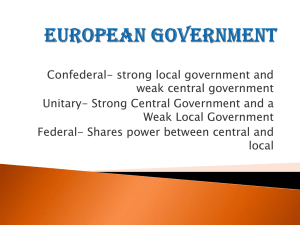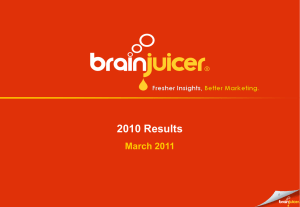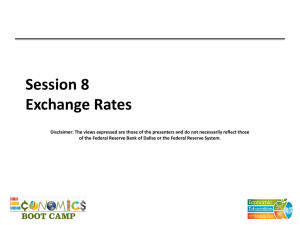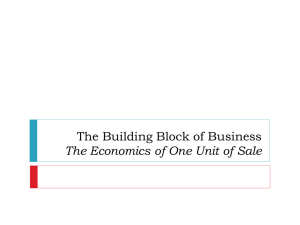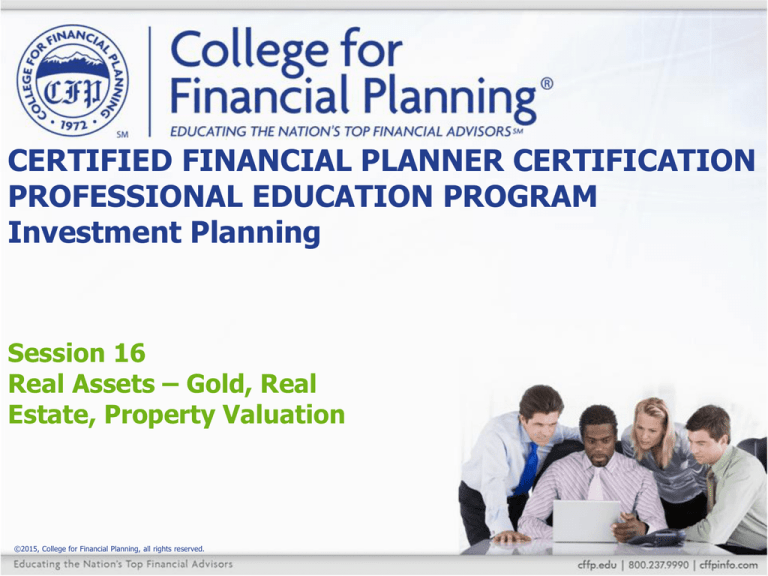
CERTIFIED FINANCIAL PLANNER CERTIFICATION
PROFESSIONAL EDUCATION PROGRAM
Investment Planning
Session 16
Real Assets – Gold, Real
Estate, Property Valuation
©2015, College for Financial Planning, all rights reserved.
Session Details
Module
9
Chapter(s) 1, 2
LOs
9-1
Explain the characteristics, risks, returns,
markets, and valuation of tangible asset
investments.
9-2
Evaluate the characteristics, risk, returns,
financing methods, types, and forms of
ownership of investment real estate.
9-3
Calculate net operating income and property
value from real estate property information.
9-6
Analyze the effect of exchange rate changes
on foreign security returns.
16-2
Investing in Tangible Assets
• No formally organized market – price quotes
•
•
•
•
not readily available, no widely disseminated
report of trades
Markets for tangible assets and collectibles may
be inefficient
Little or no regulation
High degree of liquidity risk, and problems
associated with theft, fraud, and fire
Tangible assets can be
effective inflation hedges
16-3
Types of Gold Investments
• Gold coins (American Eagle – approved
•
•
•
•
investment for IRA accounts)
Gold bullion (reputation of dealer very
important when buying and selling gold)
Gold mining stocks and ETFs (more volatile
than gold bullion price)
Gold mutual funds (or grouped
with precious metals, natural
resources)
Gold futures and options
(provides leverage)
16-4
Real Estate Investments
Types
• Land – riskiest
• Residential
• Commercial
• Industrial
16-5
Real Estate
Advantages
•
•
•
•
Tax benefits
Inflation hedge
Psychic income
Leverage
Disadvantages
•
•
•
•
•
•
•
Illiquidity
Management
High minimum investment
High transaction costs
Immobility of asset
Fixity
Economic & tax risk (subprime!)
16-6
Real Estate
Ways to Invest
Direct investments:
• Outright ownership
• General partnership
Indirect investments:
• Limited partnership
• Corporation
• REIT
• REMIC
16-7
Real Estate Investment Trusts
Benefits of REITs
• Readily marketable, trade on stock exchanges
• Personal liability limited to the amount invested, and
small sums may be invested
• Professional management of the properties
• REITs generally purchase many properties, providing
diversification
• REITs are extremely popular, and
provide the opportunity for many
investors to include real estate
as an asset class in their
portfolio.
16-8
Types of REITs
• Equity REIT – owns real estate property,
appropriate as an inflation hedge (90.5% of
market)
• Mortgage REIT – similar to a bond fund, invests
in mortgages not in properties, income is higher
than an equity REIT, not appropriate as an inflation
hedge (9.5% of market)
• Hybrid REIT – invests in both properties and
mortgages (in 2012, 0% of market)
Note: Since REITs distribute income (dividends) and the dividends are not
taxed on the company level, REIT dividends do not qualify for the
preferential capital gains rate―they are taxed as ordinary income.
16-9
Income Property Valuation
Net Operating Income (NOI)
+
=
–
=
–
=
Gross rental receipts (GRR)
Nonrental income (laundry, etc.)
Potential gross income (PGI)
Vacancy and collection losses
Effective gross income (EGI)
Operating expenses
Net operating income (NOI)
16-10
NOI Capitalization
N OI
V
C ap rate
16-11
NOI Example
The following information applies to Spacious and Gracious
Apartments:
Gross rental receipts
Other income (parking)
Average vacancy rate
$750,000
$22,000
6% of PGI
Operating expenses
$210,000
Mortgage loan payments
$362,000
Depreciation expenses
$131,000
Cap rate
12%
What is the property’s net operating income
based on this information?
And what is the property’s value?
16-12
NOI Example Solution
$750,000 Gross rents (GRR)
+
=
22,000 Other income
$772,000 Potential Gross Income (PGI)
46,320 Average vacancy rate (6% of PGI)
=
$725,680 Effective Gross Income (EGI)
210,000 Operating expenses
=
$515,680 (NOI)
Property’s value: NOI/Cap rate
$515,680/.12 = $4,297,333
16-13
Gross Income Multiplier
Sales Price
GIM
Gross Income
16-14
GIM Example
Green Mountain Apartments has $216,000 in gross rental
income. It is similar to three other apartment complexes in the
area that recently sold for the following prices. Their gross rents
are shown.
Compute the fair market value of Green Mountain using the
gross income multiplier approach. Use the average multiplier for
the three comparable properties.
Gross Rents
Sales Price
Property 1
$300,000
$2,700,000
Property 2
$200,000
$1,600,000
Property 3
$250,000
$2,000,000
16-15
GIM Example Solution
Property 1: $2,700,000/$300,000 = 9
Property 2: $1,600,000/$200,000 = 8
Property 3: $2,000,000/$250,000 = 8
Average:
9 8 8 25
8.3
3
3
Estimated value:
$216,000 x 8.3 = $1,792,800
16-16
Foreign Investments
Special Considerations
• Political risks
• Foreign taxation
• Fluctuations in
exchange rates
o devaluation
(depreciation)
o revaluation
(appreciation)
16-17
Exchange Rates
• Vary daily
• Weak U.S. dollar boosts returns of foreign
•
securities
Risk reduction through hedging with
currency futures:
o if long in a currency, short the futures
o if short in a currency, go long in the
futures
16-18
Exchange Rate Example
You are traveling in Europe and wish to
purchase euros, and the current
exchange rate is $1.49 U.S. for each
euro.
How many euros would you receive for one U.S. dollar?
1/1.49 = 0.6711 euros, or
HP10BII+: 1.49, SHIFT, 1/x
HP12C: 1.49, 1/x
This will give you 0.6711, if you hit 1/x again it brings you
back to 1.49.
16-19
Exchange Rate Calculation
From our previous example:
$1.49 for one euro or
$1 for 0.6711 euros
Calculate how many U.S. dollars you would receive
for one euro if:
0.6600 euros per U.S. dollar
0.6800 euros per U.S. dollar
16-20
Exchange Rate Calculation (2)
10BII+: 0.66, SHIFT, 1/x = 1.5152
12C: 0.66, 1/x = 1.5152
10BII+: 0.68, SHIFT, 1/x = 1.4706
12C: 0.68, 1/x = 1.4706
Discuss the relationships:
In the first example the dollar has gone down in value.
In the second example it has risen in value.
What are the implications for a U.S. investor in each
scenario?
16-21
Module 10
•
•
•
•
•
•
•
Mutual Funds – Open End and Closed End
Unit Investment Trusts (UIT’s)
Exchange Traded Funds (ETF’s)
Hedge Funds
Guaranteed Investment Contracts (GIC’s)
Dollar Cost Averaging
Selecting a Fund
16-22
Question 1
Which of the following combinations of risk is
associated with art and other collectibles?
a. regulation risk and purchasing power risk
b. liquidity risk and market risk
c. market risk and business risk
d. financial risk and reinvestment rate risk
16-23
Question 2
Your client is interested in purchasing gold as an inflation hedge.
Which of the following describes advice you would give to this client?
I.
Gold is a stable investment that has been gradually increasing over
time.
II. Gold mining stocks have approximately the same volatility as the
average U.S. large-cap stock.
III. Tangible assets, such as gold and silver, have traditionally been
considered good inflation hedges.
IV. Gold mining mutual funds may be closed to new investors if there
have been too many investment dollars flowing into the fund.
a. I and II only
b. I and III only
c. II and III only
d. III and IV only
e. II, III, and IV only
16-24
Question 3
Which of the following differentiate an equity REIT from
a mortgage REIT?
I. Mortgage REITs invest directly in properties.
II. Equity REITs have the potential for higher returns.
III.Mortgage REITs provide income whereas equity
REITs participate in the capital gains of the real
estate property.
IV. Mortgage REITs invest in mortgages that finance
property purchases.
a. I and II only
b. I, II, and III only
c. I, II, and IV only
d. I, III, and IV only
e. II, III, and IV only
16-25
Question 4
Fritz Vanderbilt owns an apartment building that had the
following financial results for the most recent year:
Rental income
Parking fee income
Vacancy and collection losses
Depreciation
Interest expense on mortgage
Other operating cash expenses
$340,000
$2,000
7% of PGI
$33,250
$41,000
$66,500
What is the net operating income (NOI) for the property?
a. $177,310
b. $210,560
c. $218,310
d. $251,560
16-26
Question 5
Charles is considering the purchase of an office building
that has a net operating income of $520,000,
depreciation expense of $54,000, and vacancy and
collection losses of $66,000. The building is financed by
an 8% mortgage loan, and interest payments for the
past year were $73,000. Charles has done an analysis
of other properties in the area, and has arrived at a
capitalization rate of 9%.
What is the maximum that Charles should pay for the
property?
a. $4,444,444
b. $5,044,444
c. $5,777,777
d. $6,500,000
16-27
Question 6
Jacqueline is doing a preliminary analysis of investment property in her city, and has
come up with the following recent sales:
Number of units
Monthly rent
Sales price
Serenity Pointe
35
$700
$2,058,000
Village Pines
40
$600
$2,592,000
Whispering Meadows
55
$550
$2,904,000
Jacqueline is considering the purchase of a 45-unit complex, Morning Vistas, with monthly
rents of $500. Morning Vistas is similar and near to the properties shown in the chart.
Morning Vistas is being offered for $2,300,000.
Which of the following statements is true?
a.
b.
c.
d.
Based upon the comparable sales, Jacqueline should only pay up to $2,160,000 for
this complex.
Based upon the comparable sales, Jacqueline should consider paying the $2,300,000
offering price for this complex.
Based upon the comparable sales, Jacqueline should act quickly since an offering
price as high as $2,600,000 would still be reasonable.
There is no reliable way to determine whether the $2,300,000 offering price may be
reasonable based upon the information provided.
16-28
Question 7
Robert is in the market for a small office building to purchase. He has
researched recent sales of similar properties in the area and has
determined that the average sales price of the properties is $2,100,000
and that the average gross rents for the properties is $280,000. He has
narrowed his choices of properties to buy to Building A, which is listed for
$1,750,000 and has gross rents of $225,000, and Building B, which is
listed for $1,400,000 and has gross rents of $200,000. The cap rate for
properties in the area is 10%.
Which one of the two buildings is the best investment option for Robert
and why?
a.
b.
c.
d.
Either, because the gross rents divided by the cap rate give values for
both properties in excess of the listed prices.
Building A, because its gross rent multiplier of 7.8 is greater than the
gross rent multiplier of 7.5 for the recently sold properties.
Building B because its value ($1,500,000) is greater than its listed
price ($1,400,000).
Either, because gross rents divided by the listed price give a cap rate
in excess of 10%.
16-29
Question 8
Which of the following statements is true?
a. Single country closed-end fund standard deviations
are higher than the standard deviations of broadly
diversified international funds.
b. The variability of returns in developed markets is
similar to the variability of returns in emerging
markets.
c. Because of tax treaties, taxes may not be withheld
on dividends paid on foreign securities.
d. A rise in the value of the dollar would benefit a U.S.
investor who has purchased international stocks.
16-30
Question 9
If a Japanese investor buys U.S. Treasury bonds
for his portfolio, which one of the following
scenarios would result in the greatest capital
gain?
a. U.S. interest rates fall and the yen
strengthens against the U.S. dollar.
b. U.S. interest rates rise and the U.S. dollar
weakens against the yen.
c. U.S. interest rates fall and the U.S. dollar
strengthens against the yen.
d. U.S. interest rates rise and the yen weakens
against the U.S. dollar.
16-31
Question 10
You took a trip to Europe and exchanged U.S. dollars into euros when the
exchange rate was $1.51 (U.S. dollars) for each euro. Upon your return
you exchanged the euros back into U.S. dollars when the exchange rate
was .68 euros for each U.S. dollar.
What has transpired concerning exchange rates between the beginning
and end of your trip?
I.
The dollar has strengthened, and you will only receive $1.47 for each
euro.
II. The dollar has weakened and you will only receive $1.47 for each
euro.
III. The euro has strengthened, and you will now receive less U.S. dollars
for each euro.
IV. The euro has weakened since it will take .68 euros for each U.S. dollar
at the end of the trip, compared with .66 euros for each U.S. dollar at
the beginning.
a. I only
b. II only
c. I and IV only
d. II and III only
16-32
CERTIFIED FINANCIAL PLANNER CERTIFICATION
PROFESSIONAL EDUCATION PROGRAM
Investment Planning
Session 16
End of Slides
©2015, College for Financial Planning, all rights reserved.

